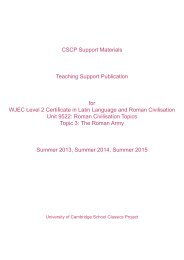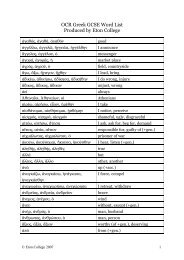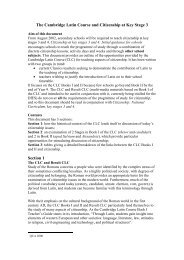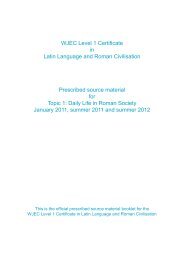2. Student Study Book - Cambridge School Classics Project
2. Student Study Book - Cambridge School Classics Project
2. Student Study Book - Cambridge School Classics Project
You also want an ePaper? Increase the reach of your titles
YUMPU automatically turns print PDFs into web optimized ePapers that Google loves.
61. Read lines 14-18 (aloud if possible) or listen to the audio on the CSCP website.6<strong>2.</strong> <strong>Study</strong> the vocabulary for these lines.63. Read lines 14-18 (or listen to the audio) again.64. What did everybody (except one person) do (lines 14-15)?65. How can you tell from the ending of discubuimus (line 14) that Cicero was one of the people who had placesaround the lunch table?66. Who was illam (line 15)?67. How did Quintus try to coax Pomponia into a better mood (lines 15-16)?68. What was her response (line 16)?69. quid multa? (line 16) is short for quid multa dicam? and is used when the speaker or writer expresses himselfbriefly instead of speaking (or continuing to speak) at length. The literal meaning would be “Why [should I say]many things?”. Two convenient English translations are in short and to sum up. You may be able to think of othertranslations which you prefer.70. (i) In lines 17-18, Cicero makes two comparisons involving the word nihil. You may find it helpful to begin bychecking your translation of two previous sentences in which he used nihil in a very similar way:nihil vidi tam mite, nihil tam placidum quam meus frater (lines 1-2)nihil potuit dulcius (line7).(ii) Translate this simplified version of lines 17-18:nihil erat lenius quam meus fraternihil erat asperius quam tua sororIf you are bothered by the endings of lenius and asperius, look back at the explanation in 25 (i).(iii) Now translate the actual words of lines 17-18, in which Cicero uses visum est (3rd person singular of theperfect tense of videor, seem) instead of erat. The ablatives meo fratre and tua sorore mean exactly thesame as quam meus frater and quam tua soror.nihil meo fratre lenius (short for nihil meo fratre lenius visum est)nihil asperius tua sorore visum est71. The way the ablative is used in line 17 is described as the ablative of comparison. It is quite common for theablative to be used in this way instead of quam. <strong>Study</strong> this pair of sentences, which both have the sametranslation:Publius est stultior quam Sextus = Publius est stultior SextoCheck your translation if necessary by referring to the foot of the page.The literal meaning of the ablative in the second sentence is Publius is stupider from [i.e. measuring from]Sextus. Sextus is the standard or starting-point or baseline from which Publius’ stupidity is measured.7<strong>2.</strong> Which person of the verb (“I”, “you”, ”he”, etc.) is praetereo (line 18)? Does this help you to decide whethermulta similia is nominative plural or accusative plural? How does Cicero answer the possible criticism: “You’rebeing very unfair to Pomponia; all this is only about a single incident”?73. The rest of the letter goes on to say that Pomponia refused to sleep with Quintus that night and that whenQuintus left for his year abroad with Cicero in Cilicia (leaving Pomponia behind, as was the normal custom atthis time for the wives of governors’ staffs), Pomponia had behaved in the same way on parting as she had atlunch at Arce.74. Translate lines 14-18.75. Cicero is writing a private letter, not a legal or political speech. But he is anxious to persuade Atticus of his pointof view, just as his speeches were intended to persuade a jury in court, or the senators or citizens of Rome. Sohe uses words in ways that will put his case as effectively as possible. For example:(i)If a writer or speaker begins two or more sentences, or sections of sentences, with the same wordor phrase, he can emphasise a key-word effectively and make his argument or narrative easier to follow.One example occurs in a wartime speech by Winston Churchill: “We shall fight on the beaches, we shallfight on the landing-grounds, we shall fight in the fields and streets, we shall fight in the hills.” Find twoexamples in Cicero’s letter, one at the beginning and one at the end, where he uses the repetition of asingle word (the same repeated word in each example) to emphasise that Pomponia had nothing tocomplain of. (Quintus had a bad temper, which may explain Cicero’s eagerness to stress that on thisoccasion, at least, he had not done anything to provoke Pomponia. On a previous occasion early in themarriage, when Cicero felt that Quintus was to blame for a quarrel with Pomponia, he had expressed hisWJEC Level 2 Latin Literature Unit 9541 Love and Marriage 23
















